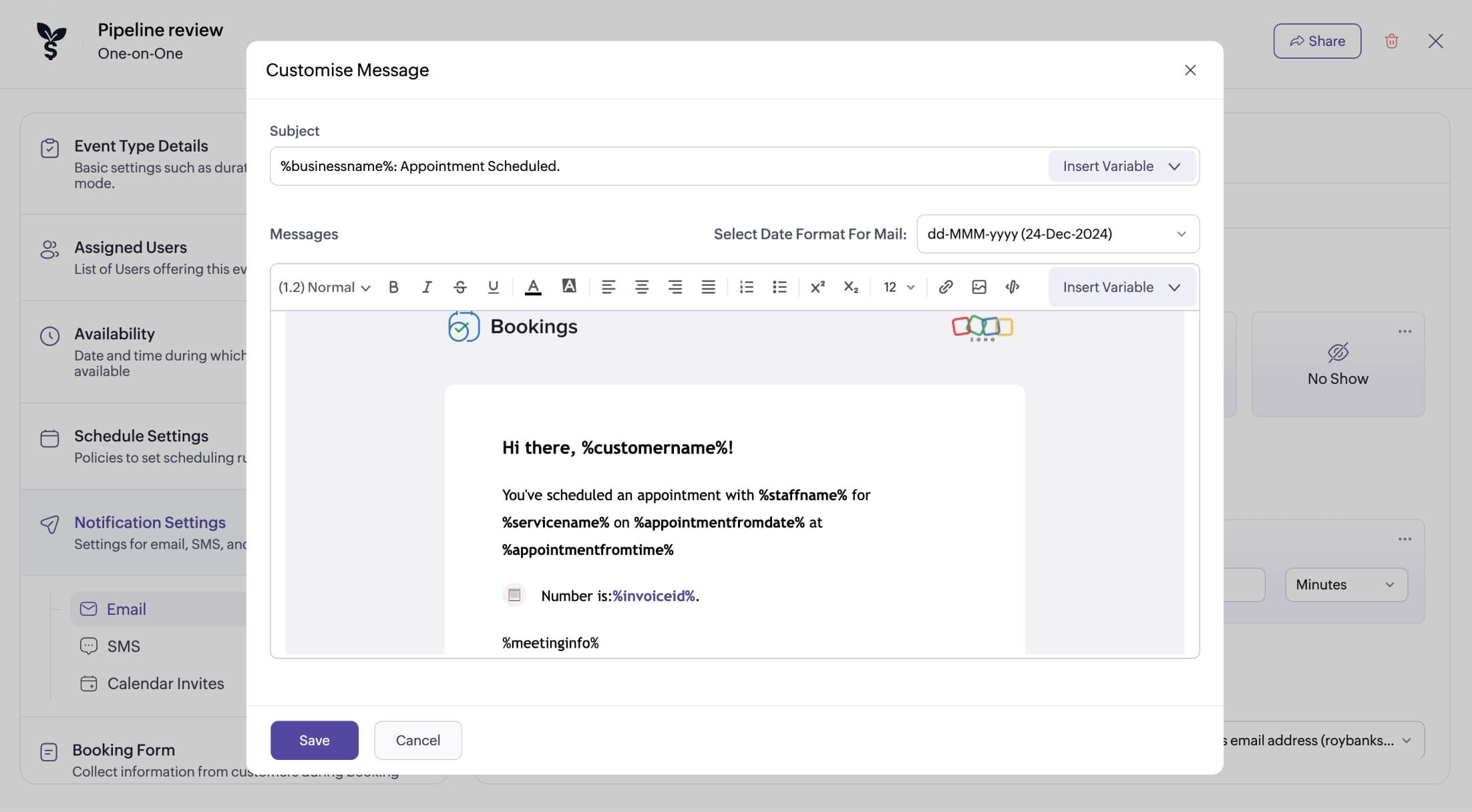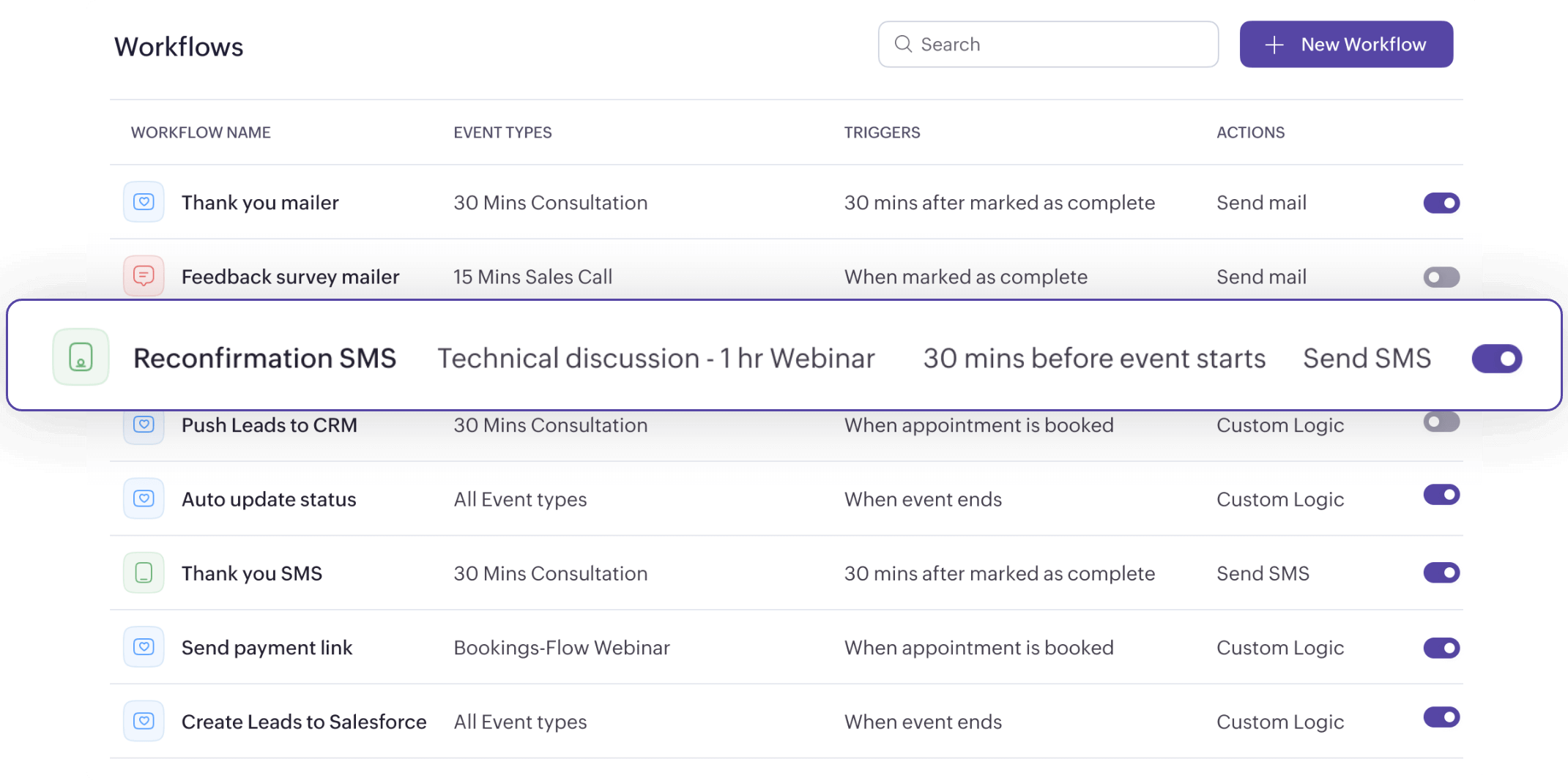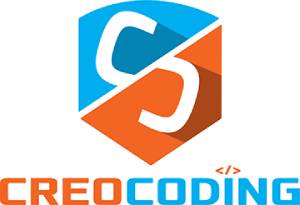How Zoho Bookings stands out from the rest
Most businesses aim to provide an exceptional customer experience—and it’s no different with Zoho Bookings. The platform ensures a seamless and customer-centric scheduling experience that helps you set up meetings in no time.
Another major advantage is that it’s part of the Zoho ecosystem, meaning it easily connects with other Zoho apps. This gives you an effortless, end-to-end workflow for your business operations.

Comparison at a glance
Here's a quick comparison of the three scheduling software solutions across key decision-making elements.
Ideal for
Individuals, teams, and businesses, especially those that prefer smart scheduling and extensive customizations
Businesses that need a well-integrated and quick-to-deploy scheduling tool
Solopreneurs, especially those who are running spas, salons, and therapy businesses
Meeting types
Supports four types of meetings: one-on-one, group, collective, and resource-based scheduling
Supports one-on-one, group collective, and group scheduling
One-on-one focus; limited in dynamic team scheduling
Customization and branding
Full white-labeling, branded booking URLs, custom email templates, and custom domain
Limited branding (logo + colors); Calendly branding remains on booking pages
Moderate branding with some white-labeling (higher tiers only)
Automation and workflows
Enhanced with custom workflows, reminders, webhooks, and Zoho Flow integration
Advanced workflows (reminders, follow-ups); more automation only on Premium+ plans
Decent automation for intake, reminders, and follow-ups
Ecosystem advantage
Deep integration with Zoho apps + third-party tools via Zoho Flow and Zapier
Integrates with major tools (CRM, calendars, video conferencing)
Strong integrations with Squarespace and other apps like Zoom, Google, and payment platforms
Ecosystem and extensibility
Best as a standalone booking system and for those using Zoho’s suite (Zoho CRM, Zoho SalesIQ, Zoho Desk, and others)
Works well as a standalone tool and with external platforms
Ideal if you're using Squarespace or similar platforms
Pricing
Free plan available; scalable pricing from /user/month
Free for basic use; paid plans start from $10/user/month
Starts from $20/month; no permanent free plan
Calendly vs. Zoho Bookings: Detailed comparison
Zoho Bookings
Zoho Bookings fills that gap with a booking experience that is flexible, brand-worthy, and built to grow alongside your business.
Calendly
Calendly is well known for its integrations and wide range of features. But what if you need to manage multiple locations? And, what if you want to create booking pages that match your branding?
- Multiple location
- Branding
- Notifications
- Payment
1. Multiple location management
Zoho Bookings lets you create workspaces that allow you to manage branches, departments, or locations within your organization. Each workspace comes with its own set of services, staff, and branding.
On the other hand, Calendly doesn’t offer a workspace concept. While you can create groups or team booking pages to simplify team management, handling multiple branches or departments isn’t straightforward. You have to juggle multiple accounts, workarounds, or setups to achieve this, which can be challenging and time-consuming.
Winner: Zoho Bookings: Better choice for businesses with multiple teams or locations
2. Branding and personalization
Zoho Bookings lets you offer a customer-centric booking experience with multiple themes and layouts, embedding options, and the ability to map pages to your domain. These booking pages can easily blend with your website and branding elements.
Plus, you can even create dedicated booking pages for individual meetings types and staff booking pages for a more personalized touch.
Calendly, however, only offers basic customization on that front. You're limited to adding a logo and picking a color theme.
Winner: Zoho Bookings: The best choice for businesses that value branding
3. Custom notifications and reminders
Zoho Bookings keeps your customers in the loop with automated email confirmations, SMS reminders, and even in-app notifications.
You can customize the email templates with your logo, brand colors, images, backgrounds, and more. Plus, you can customize sender addresses or import your own HTML email templates.
Calendly does offer automated email notifications, but with limited customization compared to Zoho Bookings.
Winner: Zoho Bookings: For better communication control along with branding

4. Payment collection flexibility
Zoho Bookings allows you to collect full or partial payments upfront, and you can even set cut-off windows and upload terms and conditions for cancellations or reschedules. This ensures higher attendance rates for your appointments.
Calendly supports payments too, but it lacks basic controls like partial payments.
Winner: Zoho Bookings: Flexible payment logic to boost your show-up rates

Explore the detailed comparison between Explore the detailed comparison between
Acuity Scheduling vs. Zoho Bookings: Detailed comparison
Acuity Scheduling
Acuity Scheduling caters to small business owners, especially those who provide wellness and personal services. It's built to handle the basic tasks around appointment scheduling.
Zoho Bookings
But, if you're trying to grow your business or scale your scheduling operations, Zoho Bookings emerges as the better option, as it's designed for flexibility and scalability. Plus, it integrates smoothly with the tools you already use. Let's take a look at how it compares to Acuity.
- Advanced automated
- Resource-based
- Integration with CRM
1. Advanced automated workflows
Acuity supports basic communication automation. You can automate confirmation emails and reminders, but it doesn’t offer the flexibility to create multi-step workflows that match your promotional or follow-up activities.
Zoho Bookings gives you full control with automated workflows that you can use to set up multiple actions.
For example, you can:
- Send prep materials or documents after a booking.
- Notify your staff and customers when a service is booked.
- Instantly create follow-up tasks in Zoho CRM.
- Send personalized emails and feedback forms after the appointment.
Winner: Zoho Bookings: For businesses that want powerful workflow automation without the complexity

2. Resource-based scheduling and rental management
Acuity is primarily designed for appointment-based services, which means it works well for one-on-one bookings and group classes. However, when it comes to resource management (such as renting out rooms, cars, or bikes), it falls behind.
Zoho Bookings has resource-based scheduling, allowing you to link services with specific resources and manage their availability with well-defined scheduling rules.
You can also define booking rules like buffer times and notice periods (minimum and maximum time limits for booking appointments), and collect payments on a predetermined basis. This makes it a better choice for businesses that offer rental-based services.
Winner: Zoho Bookings: Better solution for managing both people and resources in one place

3. Integration with CRM systems and your tech stack
Acuity has a good number of integrations, but when it comes to CRM sync, automation, and workflows, it lacks depth.
As a Zoho platform, Zoho Bookings connects seamlessly with Zoho CRM, Zoho Flow, Zoho Invoice, Zoho Calendar, and other apps in the Zoho ecosystem. It also integrates with third-party CRM solutions like HubSpot, LeadSquared, and many other apps in your existing tech stack.
Winner: Zoho Bookings: Built for businesses that rely on automation and CRM workflows
Conclusion
Every scheduling software solution comes with its own pros and cons. If you’re looking for a scheduling tool that can handle multiple locations, give you full control over your booking experience, and scale along with your business, Zoho Bookings is the better option. It’s built to keep things smart and seamless—while fitting within your budget. So, why not give it a try?


